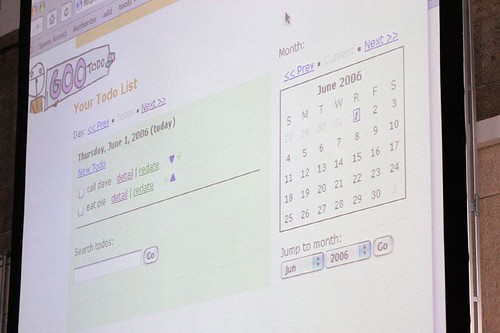One Year Oracle SocialChat from mprove on Vimeo.
You’ve just watched – hopefully – my first short movie. Thank you! Here is a bit of the back stage story.
About 6 weeks ago colleagues from SNBC (Social Network and Business Collaboration) announced a Social Use Case Competition. It was expected to submit a video of 2 to 5 minutes duration on the Social Enterprise (our internal phrase for Enterprise 2.0). Hmm – I had a few vague ideas, but no script – no actors – no experience in film making. Really the best conditions to try something!
I chose our weekly SocialChats as my main topic. But if you don’t do Danish Dogma cinema, you still need a script. Hence I played around with the SocialChat’s archive, and all of a sudden a script and even the actors appeared in front of me. The words that you have just seen are weekly topics. Slightly abridged and rearranged to form a story.
Exciting, next phase. How to get it on digital celluloid? I have to confess I am still impressed by epic. (Keep in mind, epic was done in 2004.) And my actors – words – call for a typographic style already. The main part was done over a weekend with Apple Keynote. And I even found a wonderful matching soundtrack among my albums: Didge Goes World by Delago. I picked parts of Second Day and Seventh Day. Literally, the rhythm was set, and I “just” had to complete the movie. Tools used – apart from trial and error: Keynote, Pixelmator, GarageBand, iMovie.
Finally I want to mention that I am extremely thankful to BSC Music for granting permissions to use the tracks for this short film! Without this sound it would have been just an ordinary slide show.
 If you are no longer suffering under
If you are no longer suffering under 
 How to deal with Infoglut? This was the question in our internal weekly microblogging chat a couple of weeks ago. Here are my tweets. Hope they make some sense without revealing the other parties. I fliped the order, so please read top down:
How to deal with Infoglut? This was the question in our internal weekly microblogging chat a couple of weeks ago. Here are my tweets. Hope they make some sense without revealing the other parties. I fliped the order, so please read top down: SocialChat topic this time was on building professional networks, and how to promote yourself. Read my share bottom up:
SocialChat topic this time was on building professional networks, and how to promote yourself. Read my share bottom up: